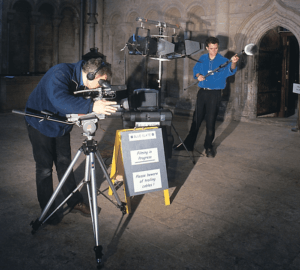 This guide has been written to help you find the right video production company to produce your corporate video – whether it is for promotional, training or purely information purposes. Whilst we are able to give general advice, each business video commission will present its own challenges and demand an individual approach.
This guide has been written to help you find the right video production company to produce your corporate video – whether it is for promotional, training or purely information purposes. Whilst we are able to give general advice, each business video commission will present its own challenges and demand an individual approach.
This guide should help you through the commissioning process, and help you to acquire a professional programme that meets your objectives.
To find a corporate videographer near you, please visit our Find a Videographer section.
What is a Corporate Video?
The term, “Corporate Video” is an all-encompassing description of video programmes made for business and/or information purposes. This includes product/service/company promotional videos, training videos and information videos.Essentially, corporate videos are business tools – and in most cases are produced to either create business, save costs or reduce risk. Whilst corporate videography has been with us for over 30 years, it is only in the past 10 years that it has really started to mature. Considered traditionally to be an expensive means of communicating your message, a corporate video can now be within the reach of companies and organisations of all sizes – and sometimes provides a much more cost-effective tool than traditional methods such as printing or one-to-one presentations of a corporate message.
What are the benefits of Corporate Video?
Video has many benefits as a communication medium. One of the main benefits is that people are familiar with television, and the vast majority of businesses and households have access to the technology to watch a video programme – be it on a TV screen, a CDROM presentation or streamed from a website. Video will also deliver a consistent message, which is particularly important when delivering training or instructional information.Video is also a dynamic medium, and can help create and enforce your company image. It is especially useful when you want to demonstrate products or events that are not easy to show your clients in normal circumstances – such as the operation of large plant or machinery, medical procedures, repetitive sales presentations, high-risk experiments or one-off situations. Video is also very easy to update, and can be readily incorporated into interactive productions, live presentations and, more recently, as part of your company website experience.
How much will my Corporate Video cost?
You have probably already reached the starting point of commissioning a corporate video, and that is identifying the need to produce one. The first question that most corporate video clients ask is, “How much will it cost?” For the corporate videographer, this is a very difficult question to answer without confusing the client. Quite simply, without proper consultation the videographer does not have sufficient information to answer this question.Video is a creative medium, and therefore there will be various ways and means of producing a successful programme. Each videographer will have their own ideas on how this can be achieved, which in turn will result in a completely different cost.
A very simple, uncomplicated programme idea could cost a similar amount to a printed colour brochure – whereas a highly polished programme, with a well-known presenter, animated 3D graphics, exotic locations and the requirement of thousands of copies could well run into 100’s of thousands of pounds.
To help you find the right producer, and for them to present you with a convincing and suitable programme proposal, it is essential for you to set the budget – or at least a rough guide as to what you would like to invest in the programme. This way the videographer can build their proposal around your budget and advise on how best to achieve your objective – including run-on duplicates, packaging and distribution.
Where do I go from here?
Your first step is to contact a reputable video production company or corporate videographer and arrange a consultation meeting to discuss your ideas. From this meeting they will be able to put together what is referred to as a ‘treatment’ or ‘proposal’, which will outline the objectives of the video, the means of production and an estimate of costs.Some video producers will produce a more detailed proposal that may include a full script and visualisation – for which there may be a charge depending on the work involved. This initial document should give you a good idea of how the completed programme will work, and give you the opportunity to adjust costs, add ideas and fine tune the programme so that it meets your requirements more precisely.
Payment terms vary from producer to producer, but a common breakdown is that one-third of the total budget will be payable on acceptance of the proposal, one-third payable on completion of shooting and the final one-third payable on acceptance of the completed programme.
The Added Benefits
The un-quantifiable benefit of commissioning a corporate video is that it can be a very enjoyable and creative exercise. Whilst the videographer will provide technical and creative expertise, you will play a very important role in the production process. You will get to appreciate the various processes and degree of craftsmanship required to produce a corporate video – and be better equipped to commission programmes in the future.
Important Notes
- Always check the credibility of the videographer by asking to see examples of their work. Whilst it is rare that they will be able to show you something exactly the same as what you require, it will give you an idea of their production competence and areas of expertise. The IOV list of qualified members is a good place to find competent videographers – governed by a professional Code of Practice.
- Always check their insurance details, and that they are familiar with copyright laws so that you are not implicated in any infringement that may arise if copyrighted material is used illegally within the programme.
- Always agree on the copyright ownership of the finished programme. Normally, this would pass on to the client once the final payment has been made. Videographers may want to retain the copyright in any material gathered in the making of the programme but not included in the final programme master. If your material is of a sensitive nature, it would not be unreasonable for you to request copyright ownership of all material. However, it would not be unreasonable for the videographer to take this into account when quoting for the programme.
- Always ask for a written agreement. You should expect to sign an agreement as soon as you are in a position to commission the programme. Agreements or contracts should at least cover copyright ownership, time-scales, right’s licence periods, a break-down of costs and details of any additional services (duplication, packaging design, web streaming rates, etc.) that form part of the company’s service.
